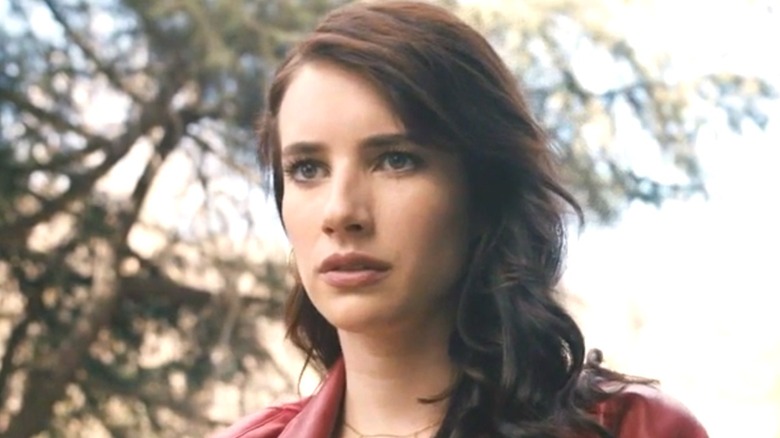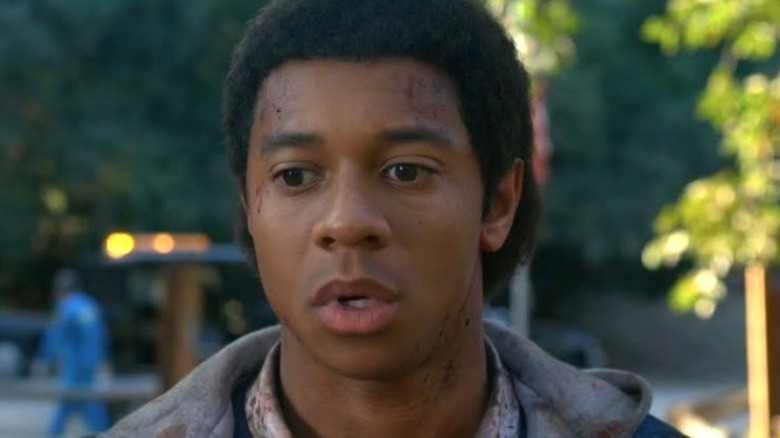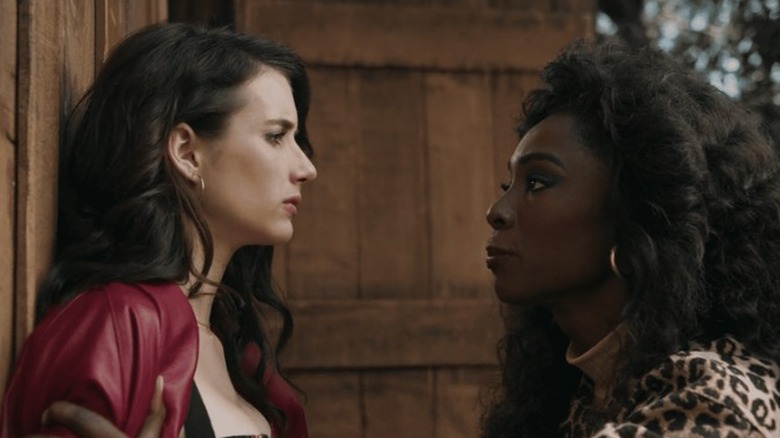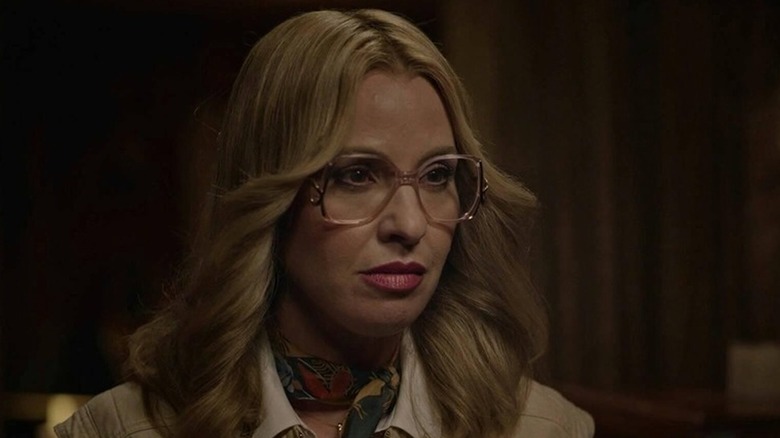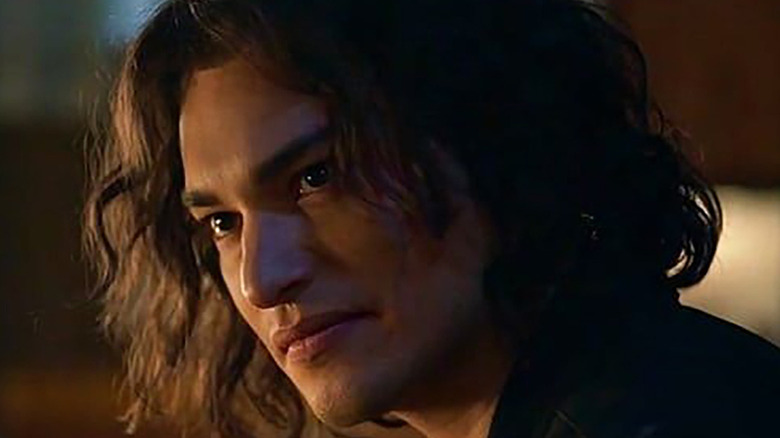The Ending Of American Horror Story Season 9 Explained
After tackling haunted houses, witches, monsters, asylums, aliens, ghosts, vampires, and the actual apocalypse, "American Horror Story" Season 9 reintroduced audiences to all the tropes, titillation, gore, sex, and s'mores of classic 1980s slasher flicks. In "AHS: 1984," creators Ryan Murphy and Brad Falchuk viewed eighties nostalgia through a contemporary lens, using the latter to simultaneously comment on and celebrate the former in the series' campiest season thus far.
While the unprecedented approach to the "AHS" universe wasn't without its defectors, the season was generally well-received by audiences who were ready for some good old fashioned jump scares and silliness in the wake of seasons such as "AHS: Cult" and "AHS: Apocalypse." However, in addition to playing up some all-too-familiar slasher tropes and archetypes, (e.g., Death by Sex, the Final Girl, Satanic Panic, and Sympathy for the Devil) "1984" managed to weave in some familiar Ryan Murphy themes as well, many of which were wholly absent in the decades-old narratives that inspired the season. These themes and explorations come to a head in the season finale, titled "Final Girl," and Murphy takes extra care to ensure they're delivered as deliberately and straightforwardly as possible.
Redemption and responsibility in the AHS: 1984 finale
In "AHS: 1984," all the most beloved slasher archetypes that you'd expect are present. There's the "slut" (Montana Duke, played by Billie Lourd), the character struggling with a past offense (Ray Powell, played by DeRon Horton), the virginal Final Girl (Brooke Thompson, played by Emma Roberts) and, of course, the super-human killer (Mr. Jingles, played by John Carroll Lynch). As the season progresses, however, these characters are cracked open to expose both the absurdity of — and sociological motivation behind — their existence in the American psyche.
Lourd's Montana Duke, for instance, has something her 1980s predecessors do not: an infuriatingly astute awareness of the injustice of — and sexism — behind her station in the narrative. Murphy goes so far as to quite literally pit Montana ("the slut") against Brooke ("the virgin"), so that they're not simply archetypal foils, but actual sworn enemies. Only in an "AHS" version of a slasher flick would the good girl end up gutting the femme fatale with a giant knife in self-defense. What's more, both women achieve redemption only by letting go of their anger toward one another —a symbiotic anger that was only ever motivated by circumstances created by the men in their lives.
In addition to Montana, Ray, "Mr. Jingles," and other various "violence and sex" obsessed archetypes (for whom the original 80s slasher plots have absolutely no love) manage to find redemption after taking responsibility for their anger and shortcomings. Ray ultimately saves Brooke's life, allowing her to be one of two Final Girls. Mr. Jingles sacrifices himself in order to protect his son. And the previously malevolent and "pissed off" ghosts of Camp Redwood manage to work together to defeat the real evil at hand, Margaret Booth (Leslie Grossman) and Richard Ramirez (Zach Villa).
Freedom and final girls in the AHS:1984 finale
For some of Camp Redwood's cast of characters, achieving freedom from the dark forces of their past becomes the ultimate goal. While Mr. Jingles, Ray, and Montana fail to achieve freedom in life, (or, as the sappy eighties end-note says, "in the living years") they're each ultimately freed of their guilt, hate, and anger. Contrastingly, psychologist Donna Chambers (Angelica Ross), good girl-turned-badass Brooke, and Mr. Jingles' son Bobby (Finn Wittrock), are able to gain some semblance of freedom from their past without having to die first.
It's no accident that "AHS: 1984" ends with not just one, but two Final Girls. That the brunette, bookish, and white virgin Brooke survives is no real surprise, and entirely in keeping with the slasher genre. ("Thank you for your sacrifice," Donna says to her earlier in the season — "I promise you'll be remembered as a feminist hero...") But that the other Final Girl ends up being — much to even her own surprise — a conflicted Black woman, with a troubled past and more than a little blood on her hands, is huge. Characters who "do bad things" and have to fight to set things straight and obtain forgiveness aren't supposed to survive, and as Donna points out in an earlier episode, Final Girls don't usually have "(her) complexion." While Brooke's ostensible escape to Oregon and marriage to a wealthy doctor is all trope, Donna's escape is a calling-out of that trope.
Importantly (and, again, in direct contrast to the slasher films of yore) the characters that achieve freedom do so by letting their demons go — not by facing them down and murdering them. In the finale of "AHS: 1984," vengeance is depicted as its own kind of prison. Violence, the narrative suggests, can't be defeated with more violence.
AHS:1984 is the most self referential season yet
From one of the earliest conversations between Ben and Vivien in the pilot episode of "American Horror Story: Murder House," it was made quite clear to audiences that the series had no intentions of shying away from extreme self-reference, and even starting a direct dialogue with viewers. "There's something about it that I find weirdly comforting," Vivian (Connie Britton) says of the grotesque and terrifying mural covering the walls in their new home, to which her psychologist husband (Dylan McDermott) replies, "... people tell stories to cope with their fears ... to give us some sense of control over the things we're scared of."
In "AHS: 1984," however, Murphy and Falchuk take that conversation to a whole new (and even more direct) level. "Men do heinous s— all the time," cries a frustrated Montana: "carve up tits, f— dead corpses. And you know what? They're treated like rock stars. Fan mail, movies and books up the wazoo. And somehow, it's always Mommy's fault for not loving them or the wife who couldn't satisfy him or the pretty girl who rejected him. Why are we always the scapegoat for sick men to blame their bull—- on?"
This calling out was partially to be expected — "deliberate camp" is, by its very nature, extremely self-aware (as explained by the BBC). However, in the finale and penultimate episode of Season 9, this awareness gets laid out so overtly that it's as if the creators are pausing the narrative in order to literally speak through their characters. Combined with Margaret Booth's bustling "macabre real estate" enterprise, ("Murder has always sold well," she insists), and Montana's extended monologue, one gets the impression that Stefanie Black's National Enquirer reporter is intended to act as a fun-house mirror proxy of Murphy himself. "I can make serial killers look sexy and fun," she quips.
Ryan Murphy knew exactly what he was doing with Richard Ramirez in 1984
Considering the trouble that Ryan Murphy went through to ensure audiences' awareness of his own awareness of what it means to tell a horror story — and what society is willing to admit it means — one wonders if Murphy wasn't already mounting a pre-emptive defense against the inevitable backlash "AHS: 1984" received in regard to the season's depiction of "Night Stalker" Richard Ramirez. Many fans felt that Season 9's Night Stalker (as opposed to Season 5's iteration) was unnecessarily glamorized, particularly since many of Ramirez's surviving victims are still alive. And yet, what the ending of "AHS: 1984" seems very apparently to be saying — or at the very least, attempting to say — is that this is a situation where it takes two to tango.
The success of "American Horror Story" relies on (and, ultimately, reiterates and demonstrates) the inseparable nature of revulsion and attraction. Both Season 4, "Freak Show," and Season 5, "Hotel," more explicitly explored this relationship, forcing audiences to reflect on their own twisted fascination with — for example — serial killers and sensationalized murder. After all, slasher films didn't simply spring up out of nowhere. Like all forms of art, they were a response to a very particular demand that already existed. Every generation finds a new way to transform its worst fears into entertainment, and as "AHS: 1984" reminds viewers — repeatedly, and with all the subtlety of an actual slasher film — the media can only ever "glamorize" that which society has already deemed worthy.
In Season 9, Murphy may well be serving up "Spahn Ranch, with a Ferris Wheel," (as Margaret Booth would say) but the line to ride on that wheel is a long and enthusiastic one.
